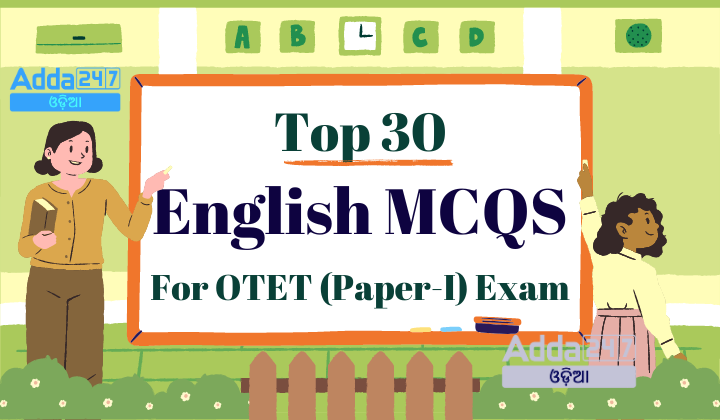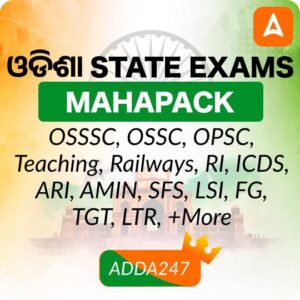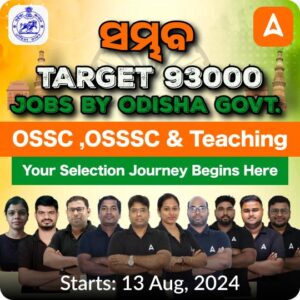Preparing for the OTET exam requires a strong foundation in English grammar and comprehension. Our curated list of the top 30 English Multiple Choice Questions (MCQs) covers key areas such as idioms and phrases, synonyms and antonyms, parts of speech, verb tenses, and correct verb forms. These questions are designed to test and enhance your understanding of essential concepts, ensuring you are well-equipped for the exam. Each question is carefully selected to reflect the types of questions likely to appear on the test, providing a valuable tool for effective exam preparation.
Top 30 English MCQS For OTET(Paper-I) Exam
- The interdependence of listening and speaking skills implies that:
(a) Both should be taught separately for maximum effect
(b) Listening is more important than speaking
(c) Proficiency in one skill enhances the other
(d) Writing should precede the teaching of these skills
Ans: (c) Proficiency in one skill enhances the other - Which technique is most effective in developing listening skills in young learners?
(a) Silent reading sessions
(b) Extensive grammar exercises
(c) Storytelling with interactive questioning
(d) Memorization of vocabulary lists
Ans: (c) Storytelling with interactive questioning - In teaching speaking skills, which activity would most effectively enhance fluency?
(a) Grammar drills
(b) Recitation of poems
(c) Role-playing dialogues
(d) Writing essays
Ans: (c) Role-playing dialogues - The primary goal of teaching reading at the elementary level is:
(a) To enable students to read and interpret complex texts
(b) To develop a habit of silent reading
(c) To enhance comprehension and fluency in reading
(d) To focus on pronunciation and phonetics only
Ans: (c) To enhance comprehension and fluency in reading - Which strategy best supports the development of reading comprehension skills?
(a) Encouraging speed reading
(b) Teaching phonics and word recognition
(c) Focusing on the memorization of texts
(d) Avoiding complex sentences and paragraphs
Ans: (b) Teaching phonics and word recognition - Techniques like recitation, storytelling, and dialogue are most useful for:
(a) Developing vocabulary
(b) Enhancing writing skills
(c) Building listening and speaking skills
(d) Strengthening grammar knowledge
Ans: (c) Building listening and speaking skills - Effective teaching of writing composition at the elementary level requires:
(a) A focus on grammar and syntax
(b) Creative exercises that encourage self-expression
(c) Memorization of model compositions
(d) Emphasis on handwriting and neatness
Ans: (b) Creative exercises that encourage self-expression - Which method is most effective for teaching sentence construction in early writing?
(a) Dictation exercises
(b) Using sentence stems and scaffolding
(c) Memorizing grammar rules
(d) Rewriting paragraphs
Ans: (b) Using sentence stems and scaffolding - An effective approach to teaching reading involves:
(a) Isolating phonics from comprehension exercises
(b) Integrating phonics with reading for meaning
(c) Focusing only on vocabulary building
(d) Limiting the use of visual aids
Ans: (b) Integrating phonics with reading for meaning - To improve listening comprehension, students should:
(a) Focus on listening to native speakers only
(b) Be exposed to a variety of spoken English contexts
(c) Practice listening with the aid of subtitles
(d) Limit their listening practice to the classroom
Ans: (b) Be exposed to a variety of spoken English contexts - Which part of speech is the word ‘quickly’ in the sentence ‘She ran quickly’?
(a) Noun
(b) Verb
(c) Adverb
(d) Adjective
Ans: (c) Adverb - Change the narration: He said, “I will help you.”
(a) He said that he would help me.
(b) He said that he will help me.
(c) He said that he can help me.
(d) He said that he should help me.
Ans: (a) He said that he would help me. - Identify the correct tense: ‘She has been studying for two hours.’
(a) Simple present
(b) Present continuous
(c) Present perfect continuous
(d) Past continuous
Ans: (c) Present perfect continuous - Convert to passive voice: ‘They are watching a movie.’
(a) A movie is watched by them.
(b) A movie is being watched by them.
(c) A movie was being watched by them.
(d) A movie has been watched by them.
Ans: (b) A movie is being watched by them. - Fill in the blank with the correct article: ‘He is ___ honest man.’
(a) a
(b) an
(c) the
(d) none
Ans: (b) an - Which of the following is a synonym of “Illuminate”?
(a) Darken
(b) Clarify
(c) Obscure
(d) Confuse
Ans: (b) Clarify - What part of speech is “Incessant”?
(a) Noun
(b) Verb
(c) Adjective
(d) Adverb
Ans: (c) Adjective - What is the antonym of “Incessant”?
(a) Unceasing
(b) Relentless
(c) Persistent
(d) Intermittent
Ans: (d) Intermittent - What does the word “Impediment” refer to?
(a) A helper
(b) An obstacle or hindrance
(c) A bright light
(d) An assistant
Ans: (b) An obstacle or hindrance - Choose the active voice form of the sentence: “The book was written by the author.”
A) The author is writing the book.
B) The author wrote the book.
C) The author will write the book.
D) The author writes the book.
Answer: B) The author wrote the book. - Choose the active voice form of the exclamatory sentence: “How exciting was the game played by them!”
A) What a game they played!
B) How exciting the game they played!
C) How exciting the game was played by them!
D) What a game by them!
Answer: A) What a game they played! - Choose the correct homonym in the sentence:”He ate his ______ for breakfast.”
A) serial
B) cereal
C) sirial
D) seriel
Answer: B) cereal - Identify the correctly spelled word:
A) Accommodate
B) Acomodate
C) Accomodate
D) Accomadate
Answer: A) Accommodate - Identify the correctly spelled word:
A) Ressurection
B) Resurrection
C) Resurection
D) Resurecction
Answer: B) Resurrection - A person who hates mankind is called a ______.
A) philanthropist
B) misanthrope
C) misogynist
D) misogamist
Answer: B) misanthropeSelect the most appropriate option to fill in the blank in the given sentence. - ____________ Rama became a minister; he didn’t allow any of his relatives to live with him.
(a) As long as
(b) In case
(c) As soon as
(d) In order that
Ans. (c) As soon as - Read the following passage and answer the following:
The dense Amazon rainforest, often referred to as the “lungs of the Earth,” is a vital component of our planet’s ecosystem. Covering over 5.5 million square kilometers, it produces about 20% of the world’s oxygen. The Amazon is not only home to an incredible diversity of wildlife but also serves as a crucial carbon sink, absorbing vast amounts of CO2 from the atmosphere. However, deforestation poses a significant threat to this unique environment. Human activities, such as logging, agriculture, and mining, have led to the loss of millions of hectares of forest. Protecting the Amazon is not just about preserving nature; it’s essential for combating climate change and ensuring the survival of countless species.
What percentage of the world’s oxygen is produced by the Amazon rainforest?
(a) 10%
(b) 15%
(c) 20%
(d) 25%
Ans: (c) 20% - The Amazon rainforest is often referred to as the “lungs of the Earth” because it:
(a) Absorbs CO2
(b) Produces oxygen
(c) Houses diverse wildlife
(d) All of the above
Ans: (d) All of the above - What is one of the main threats to the Amazon rainforest?
(a) Flooding
(b) Climate change
(c) Deforestation
(d) Earthquakes
Ans: (c) Deforestation - Which of the following is NOT a human activity that contributes to deforestation in the Amazon?
(a) Logging
(b) Agriculture
(c) Mining
(d) Conservation
Ans: (d) Conservation - Why is it important to protect the Amazon rainforest?
(a) To reduce flooding
(b) To preserve cultural heritage
(c) To combat climate change and preserve species
(d) To increase agriculture land
Ans: (c) To combat climate change and preserve species










